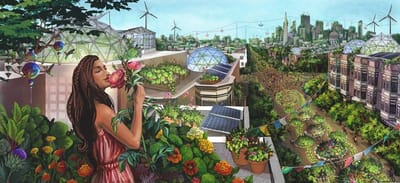“Do I need to go back to school to get an Environmental Science degree (or something similar) in order to work on climate?”
I have a few thoughts on this.
1. If you are able to take time off, have the ability to spend money on another degree, and actually want to learn the topic, then go for it! Do your research and see what program interests you, and more importantly, will support the work you want to do after you graduate. Ask yourself, “How will this degree, combined with my design skills and background, further my work in climate?”
2. If you are not able to take time off or do not have the financial means to get another degree, then look into all of the free to low cost options available. There are many online resources, programs, and courses available, many of which are free or offer discounts or scholarships. Also, there’s a large number of initiatives and pathways at the local level are popping up each year, ensuring people learn from, learn about, and learn within their communities.
Regardless on what path you take, I would recommend finding out what space you want to explore, what solutions and approaches interests you. Because if you are going to dive deep into this work, making sure you have some sort of connection to it will be helpful.
Here is a glimpse into my journey
- Transitioned from working in social impact to climate (which wasn't that big of a leap)
- Learned all things climate based on my personal interests
- Watched YouTube videos and documentaries on basic climate science, policy, and on projects addressing our climate breakdown (I joke around saying that I got my degree from “YouTube University”)
- Learned “on the job” by researching the industry of clients so that I can know more about their space in preparing Discovery calls
- Became friends with people within various climate backgrounds to geek out and talk shop over a beer or burrito
- Joined climate communities as a way to gain perspectives on challenges, solutions, approaches, and interventions
- Attended a ton of climate events, often being the only designer in the audience, to connect and ask questions through the lens of design
- Leveled up my knowledge that speak to “the edges of climate”; behavior change, narratives, world building, etc
One of the best things about taking climate action in 2025 is the amount of opportunities out there online and in local communities. Today looks very different that when I started my climate design journey in 2016.
How are you leveling up your climate knowledge?
Receive the latest posts in your inbox





